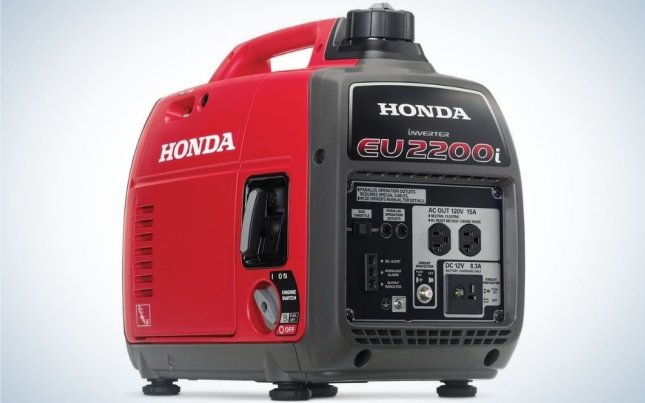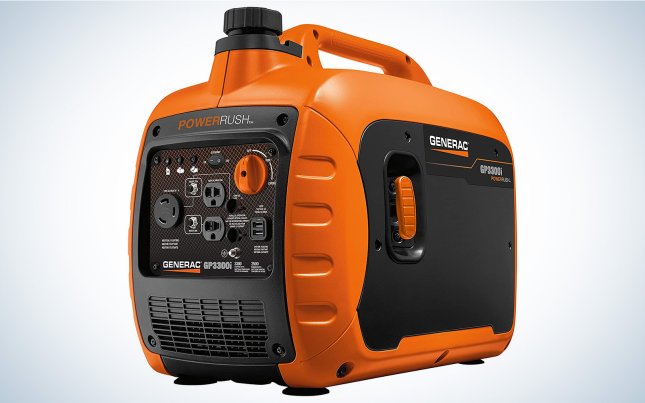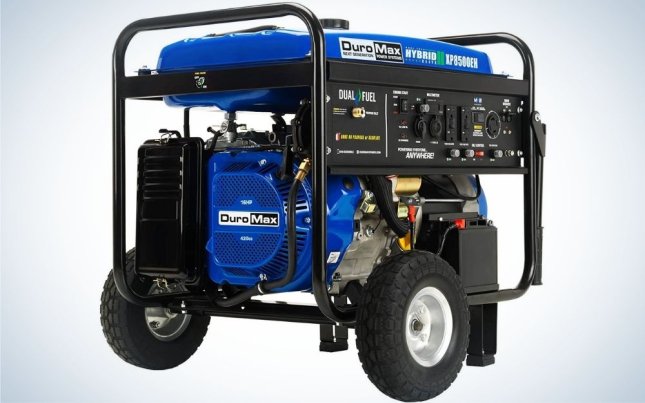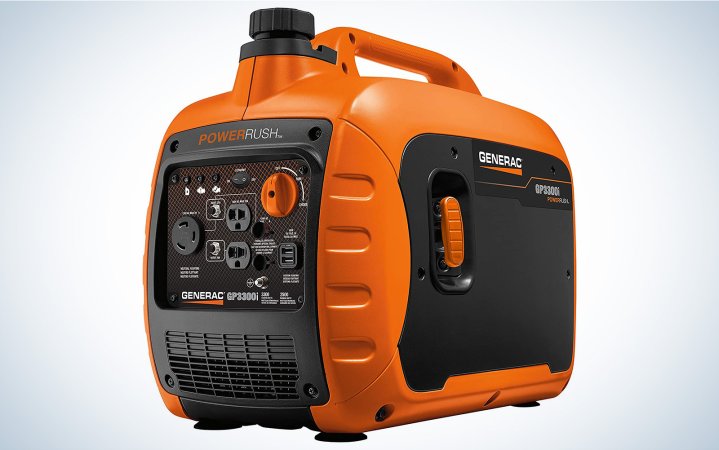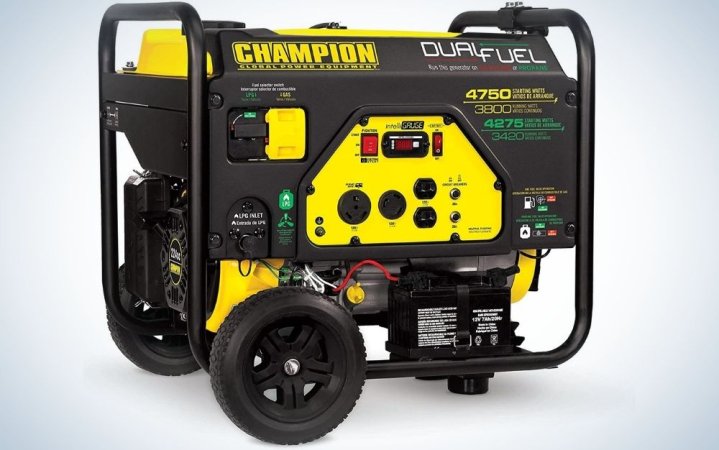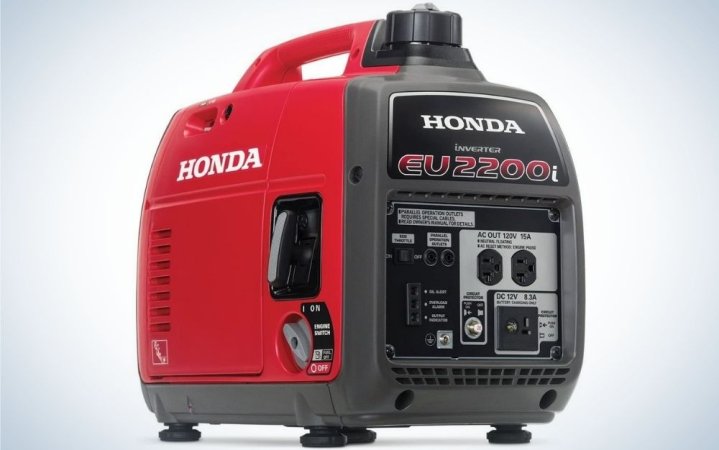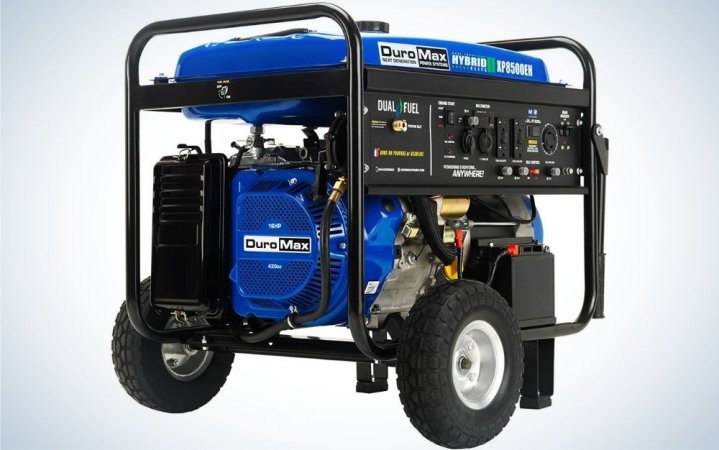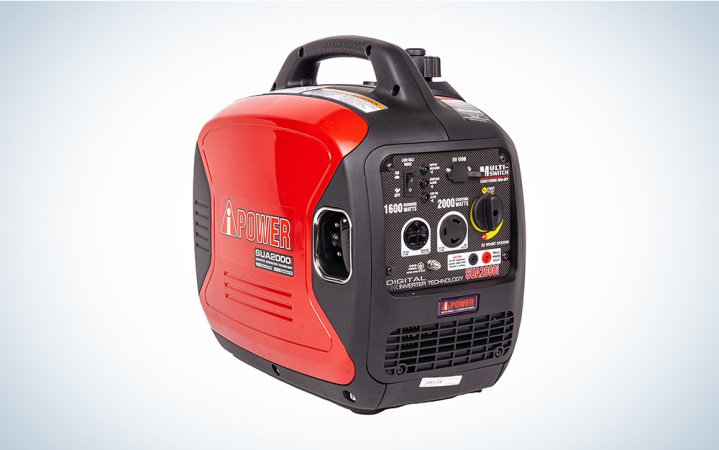We may earn revenue from the products available on this page and participate in affiliate programs. Learn more ›
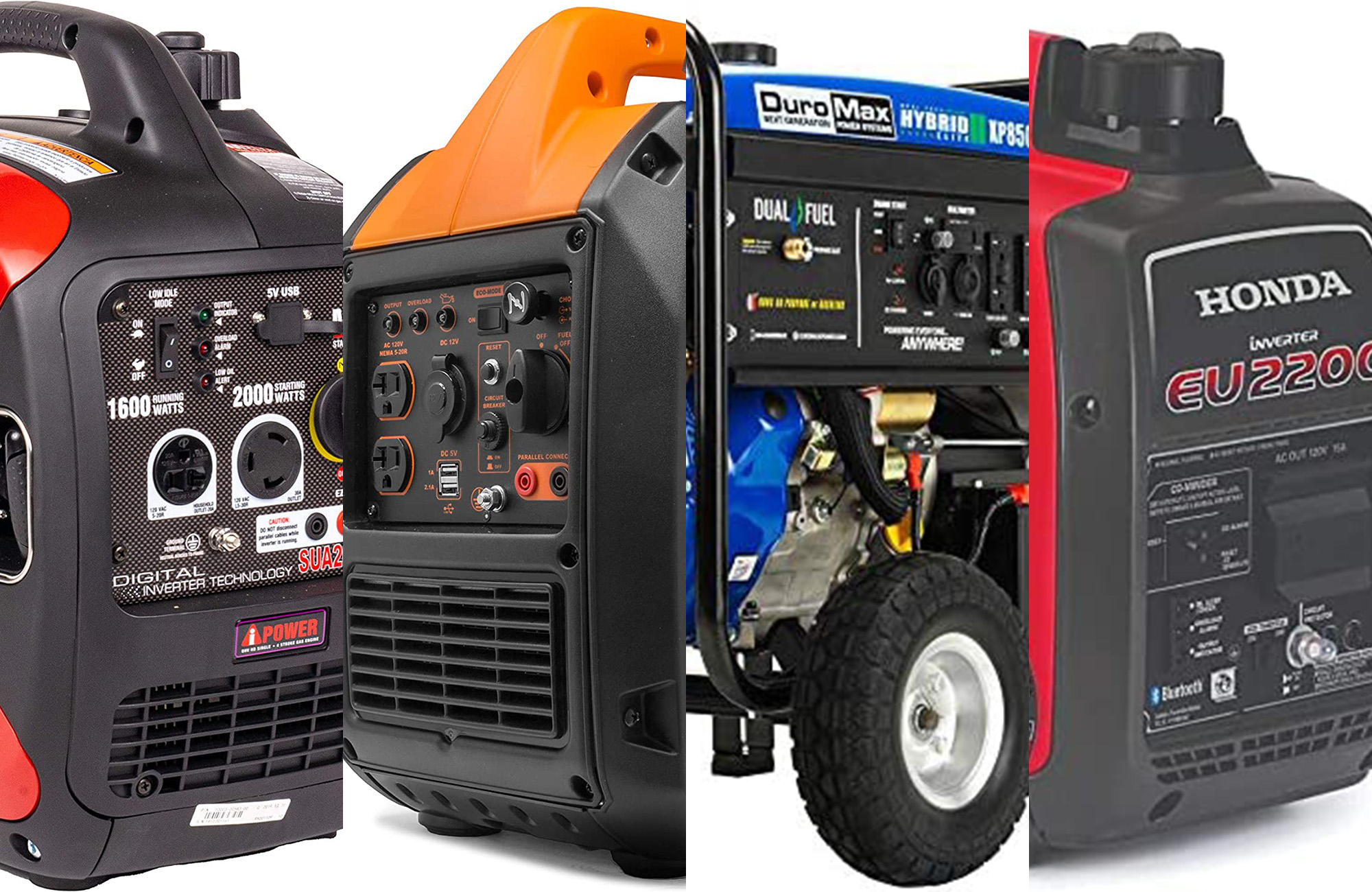
It’s always a good idea to have a backup gas generator in your possession. Storms can knock out your home’s electricity. Rural areas may have unreliable power networks. Or maybe you need an efficient way to operate tools and equipment on a job site. Frankly, owning a portable gas generator is a lifesaver when disaster strikes. And they’re a must for epic camping trips. But these heavy-duty machines can be expensive and complicated. Before you invest in a backup generator, learn about the different features and power output options. Find a portable power station that works when it matters most, and discover how today’s best gas generators keep appliances running and households happy.
- Best overall: Generac GP3300i
- Runner-up: Champion Power Equipment 201052 Dual-Fuel Portable Generator
- Best for travelers: Honda 662220 EU2200i Portable Inverter Generator
- Best for homeowners: DuroMax XP8500EH Portable Generator
- Best for small appliances: A-iPower SUA2000iV 2000-Watt Portable Inverter Generator
How we chose the best gas generators
To ignite our mission to find the best gas generators, we looked at reviews, recommendations, conducted user testing, and performed heavy research. We also took knowledge from other generator stories and applied it here.
The best gas generators: Reviews & Recommendations
With so many gas generators on the market, where do you start? The first step is knowing how you want to use the generator. Then set a budget and look for the features that are important to your specific needs. For instance, do you need extra or specialized outlets for RVs? Do you want to power the entire home? Or do you only need to charge a smartphone? Find the best gas generator and stay energized.
Best overall: Generac GP3300i
Top pick
Safe Steady Power
Pros
- Powerful enough to run full-sized appliances
- Easy to carry for its heft
- Quiet running thanks to inverter power
- Can work in concert with another unit (with the optional parallel cable).
Cons
- Pricey
- Heavier than other portables
Why it made the cut: It has enough power to keep your major appliances running and smart power management to do it as efficiently as possible.
Specs
- Weight: 59.4 pounds
- Watts: 3,300 (max)
- Number of outlets: 3
At just under 60 pounds, this isn’t the most portable generator around, but it’s packed with enough power and features to make it a solid overall pick for most uses from extended camping trips to emergency home backup. This generator runs at 2,500 watts, but it can crank up to 3,300 starting watts to get bigger electric motors going without straining.
The connections include three 120V AC outlets, as well as a pair of 5V USB ports for charging small devices like phones and tablets. The main engine is powerful enough to run a full-sized fridge to keep your food from spoiling during a long power outage. Despite all of its built-in power, this generator can also daisy chain with another identical unit to augment the power output. Its economy mode tweaks engine speed to meet specific demands so it’s not unnecessarily burning pricey fuel when it doesn’t need the extra oomph.
At the end of the day, this generator puts out plenty of clean power that’s suitable even for sensitive electronics like computers without much of a hassle. That’s a big deal when the power is out and you really want to keep the lights (and everything else) on.
Runner-up: Champion Power Equipment 201052 Dual-Fuel Portable Generator
Reliable Power
Pros
- Dual-fuel allows for flexibility
- Can power major appliances
- Lots of outlets for different kinds of equipment
Cons
- Heavy
- Loud
Why it made the cut: Power your fridge or a chainsaw with this heavy-duty generator.
Specs
- Weight: 119 lbs.
- Watts: 3,800 watts
- Hours of power: Up to 14 hours of run time on gasoline or 10.5 hours on propane.
- Number of outlets: 4
The 3,800-watt Champion generator can use gas or propane, making it a great all-around generator. But it really excels during a crisis when you need electricity most. If the power goes out during a storm or other disaster, use the Champion gas generator to run refrigerators, freezers, sump pumps, and just about any other major appliance. It’s also a great source of energy for power tools, a huge plus during disaster cleanup. The biggest downside is the noise. At 68dB, it’s not a quiet machine. We wouldn’t recommend this for outdoor parties and events. But when you need solid, reliable power, this is the best beast of portable gas generators.
Best for travelers: Honda 662220 EU2200i Portable Inverter Generator
Ideal for Road Warriors
Pros
- Reliable
- Quiet
- Energy-efficient
Cons
- Expensive
Why it made the cut: This generator is quiet and light, making it a perfect addition to your next RV adventure.
Specs
- Weight: 46.5 lbs.
- Watts: 2200 watts
- Hours of power: 10 hours
- Number of outlets: 2
If you’re already a seasoned RV enthusiast, you know the high-quality of Honda gas generators. The EU2200i is a reliable inverter gas generator that’s surprisingly, and pleasantly, quiet. The 48dB is more than acceptable for an RV generator. And the 2,200 watts can power up air conditioning units and other heavy-duty RV appliances and still have enough juice to charge smartphones and tablets with ease. It’s an energy-efficient generator, capable of operating for nearly 10 hours on a single tank (depending on how hard you’re using it, of course). The big drawback is price. At over $1,000, this is far from the cheapest gas generator for RVs. But it is one of the best and most reliable.
Best for homeowners: DuroMax XP8500EH Dual-Fuel Portable Generator
Huge Power Output
Pros
- Portable
- Lots of outlets
- Dual-fuel
Cons
- Heavy
Why it made the cut: A behemoth generator like this is your best bet for re-powering the entire house.
Specs
- Weight: 204 lbs.
- Watts: 8,500 watts
- Hours of power: 48 hours
- Number of outlets: 4
For powering an entire house, the DuraMax Dual-Fuel generator is the machine for the job. It’s a portable generator with the energy output of a whole home generator. The dual-fuel system lets you run it on gasoline or propane, or both. With two USB outlets, four household outlets, a 120/240V twist lock, and one vehicle outlet, you’ll have plenty of options for keeping the power on. This is a heavy-duty generator, weighing over 200 pounds, so it may not be great for food trucks, campers, and other mobile uses. However, the 8,500 watts is hard to beat, making this the best fuel generator when big power is needed.
Best for small appliances: A-iPower SUA2000iV 2000 Watt Portable Inverter Generator
Efficient Supply
Pros
- Budget-friendly
- Quiet
- “Low idle” mode for extended run time
Cons
- Heavy
Why it made the cut: You don’t need to spend much to bring your small appliances back to life.
Specs
- Weight: 50 lbs.
- Watts: 2,000
- Hours of power: 4 hours
- Number of outlets: 1
A gas generator under $500 can’t be expected to power an entire house or RV. The A-iPower gas generator is a portable power source that works best on small appliances like fans, lamps, and mini-fridges. This compact inverter generator can power anything up to 800 watts. It runs on gasoline and only makes 52 decibels of noise—that’s as loud as a running refrigerator or a quiet street. If you don’t mind the wattage and weight, and only plan to use this in case of emergencies, the A-iPower generator is a great, inexpensive energy solution.
What to consider when buying the best gas generators
Modern gas generators are high-tech, sophisticated pieces of equipment. Designed for dependability and safety, the best portable generator must be ready to run and easy to operate. Before buying and using a gas-powered energy station, understand how they work, what they offer, and where they provide the most efficient flow of electricity.
How much electricity do you need to generate?
The generator used to power up a laptop on a stormy night won’t be ideal for keeping all major appliances running during a multi-day blackout. Look closely at the specs and product descriptions. Most portable gas generators produce between 200 and 7,500 watts.
How do you know how many watts you need? Multiply the voltage (120V in the U.S.) by the amperage of the product (usually found on the back of the appliance or on a tag). The result is the necessary wattage. For example, a refrigerator that uses 6 amps will need 720 watts to keep it running smoothly. You’ll need a generator that can offer at least that much wattage if you want the fridge to stay chilly.
A gasoline generator will list two wattage numbers: starting watts and running watts. Some appliances need a big boost of power to get up and running; that’s the starting watts. But the appliance won’t need as much wattage to sustain its operation; that’s the running watts
To calculate how much wattage you’ll need, make a list of the appliances you’d like to keep running and include the running watts and starting watts as two separate numbers. Add up all the running wattage. Find the highest starting wattage and add this number to the total running wattage. This gives you a rough idea of how much power is required.
Confused? Simply put, your power generator needs more wattage than you think. For RVs and camping generators, look for an option that supplies between 2,000 and 4,000 watts. For a standard house out in a rural area on an unreliable grid, a generator should provide between 5,000 and 7,000 watts. This will keep appliances such as refrigerators, freezers, water pumps, and lights running smoothly. In addition, consider these variables: How many appliances do you have running simultaneously? Do you want to keep the AC operating? What about an electric water heater? Do you use an electric oven? That said, no two homes are alike, so the above numbers are approximations.
Before buying a gas generator, think carefully about how you want to use it. If all you want is a steady power supply to keep the lights on, get a low-wattage generator. Lights only eat up about 60 watts of power. But if you want to make smoothies during a camping trip, you’ll need more power to put the blender on blast. (Blenders need about 500 starting watts and 300 running watts.)
Whole house generator vs. portable gas generator
Don’t expect a 1,000-watt portable generator to electrify an entire home. While portable gas generators can be used as handy backup generators during a power outage, those who are looking for something to maintain normal operations of the entire household during an outage should invest in a whole house generator.
These natural generators can cost around $5,000 and are permanently installed outside the home. They are directly connected to your home’s power and will automatically turn on if the power goes out. Running on natural gas or propane, modern whole-house generators are operated via user-friendly smartphone apps. Homeowners can monitor and manage the whole-house gas generator with a simple tap on a screen. If you need a substantial backup power solution, invest in a whole-house generator.
Stay safe when using your gas generator
A gas generator should never be used in a confined space with poor ventilation. These generators produce carbon monoxide (CO) exhaust. It’s odorless and deadly. The best gas generator will have a safety feature that shuts off the machine when a buildup of CO gas is detected. However, don’t rely on the gas generator alone to protect you. Always use the gas generator thoughtfully and carefully.
For example, never use the gas generator in a garage, even if the door is open. CO gas can collect in the garage and seep into the rest of the house. And never use a gas generator in a shed or basement. Keep the gas generator outdoors and a minimum of 20 feet away from the house. And always direct the exhaust away from windows and doors.
The noise factor
Gas-powered generators are judged by two important factors: Wattage and decibels. Gas generators can be loud…very loud. Typically, a gas generator coughs up between 65 dB and 100 dB. For comparison, a motorcycle revs up about 95 dB and an approaching subway train squeals out 100 dB of annoying noise pollution. Gas generators may not be as loud as a subway train, but even mildly loud sounds can cause hearing loss over a period of time.
Look carefully at the decibel rating of a gas generator. If you plan on using the portable generator for an event, make sure the motor won’t drown out the party with incessant rumbles. Find the quietest generator available. And don’t put yourself or anyone else at risk by trying to muffle the noise with blankets. Gas generators need to breathe.
Fuel source: What powers the power?
Most portable generators run on standard gasoline. It’s relatively inexpensive and widely available. But some generators can also use propane or natural gas. Natural-gas generators are popular as home standby generators because they can connect with the existing gas line. Natural-gas generators are also quieter. Propane generators are great during an emergency, when the local gas station is overrun with customers. Propane doesn’t go stale, so it’s a good option for stocking up and storing.
Dual-fuel generators use a combination of gas and propane, or natural gas and propane. They can switch between the two fuel options, and they’re great for RVs and camping trips when you’re not sure what type of fuel will be available. (There are also solar generators, if you’re going off-grid and would have a hard time carrying fuel, but we concentrated on gas-powered generators in this round-up.)
FAQs
A good gasoline generator must check three boxes: The right amount of power, the right noise level, and the right price. For homeowners in need of a backup generator capable of powering most major appliances, you’ll need between 4,000 and 7,000 watts. It’s always best to overshoot your power needs to account for starting wattage. Unless you use a battery-powered generator, expect the generator to be noisy. Anything over 70dB can be irritating, while anything over 100dB will sound like a piece of industrial equipment. The best gas generator must also be affordable. For a 4,000-watt backup generator, expect to pay about $500.
To power a house, you’ll need at least 2,000 watts. It really depends on what items you need to juice up. Lights and laptops use relatively little power. Meanwhile, electric water heaters and AC units are big power drains. If you plan to use the generator to keep your entire house fully operational, you may need 7,000 watts. Make a list of the appliances that matter most, as well as the gadgets and tools you can’t live without. This may include refrigerators and electric stoves. Calculate the wattage (amps multiplied by voltage) of each appliance and add extra wattage for starting the appliance. This will give you a rough idea of how much wattage you’ll need from a gas generator.
Yes, gas generators are worth the money. During an emergency, access to dependable electricity can be a matter of life or death. Being able to turn on heat in the winter and AC in the summer is critical, especially for the elderly. With hurricanes and natural disasters becoming more common, equipping your home with a backup generator is not just a good idea, it’s a necessity. That said, how much you want to spend on the generator is up to you. A cheap, $200 generator may be all you need to turn on the lights and use an electric stove. A $5,000 natural gasoline generator can run the entire house. No matter how much you spend, if the generator is to be used during a disaster, you must have a fuel supply ready. Gasoline can go bad, so check your generator regularly.
Final thoughts on the best gas generators
When you need a dependable source of power, a gas generator is the magic box to keep things running smoothly. These hard-working machines provide enough electricity to run necessary appliances—and then some. Understand the differences between fuel options and don’t overlook the decibel rating. Add up how much wattage you need and you’ll find the best gas generator for the job.
